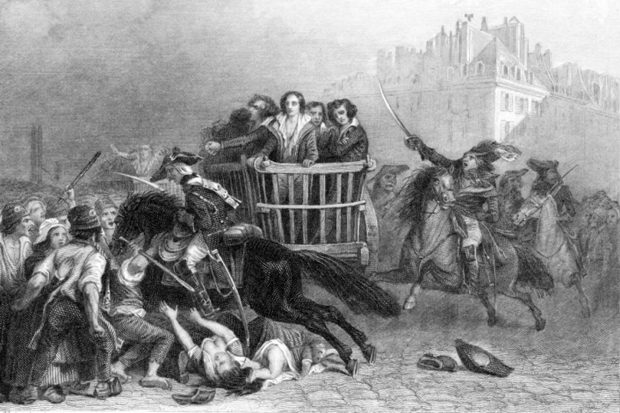The French Revolution ushered in not only a revolution of rolling heads but of talking ones too. ‘Speech-making was a new political instrument,’ writes Eric Hazan. ‘The King of France never gave speeches and neither did his ministers.’ Indeed Louis XVI’s lack of eloquence, or more specifically his egregious line of sentimental claptrap, had fatal repercussions for him in the court of public opinion.
He was certainly no Mirabeau, whose speeches, printed in their thousands, were heard right across the country. Travelling in France at the time of the Revolution, the English writer Arthur Young noted how the Parisian coffee houses were alive with speech-making: ‘Expectant crowds are at the doors and windows, listening à gorge déployée to certain orators, who from chairs or tables harangue each his little audience.’
It was in this spirit of self-affirmation that Hazan says societies and local clubs mushroomed in the winter of 1790 and in the same coffee houses that the people who would soon be called the sans-culottes — so named because they wore cloth trousers instead of the silk breeches and stockings of the aristocrats — acquired their political education.
It is this kind of fine eye for the mechanics of the French Revolution that Hazan brings to bear in his riveting popular history. A dyed-in-the-wool communist who was once a ‘suitcase carrier’ for the Algerian FLN, the French-Jewish Hazan makes no bones about his revolutionary partisanship, but he is not a boring dogmatist either. He even finds something nice to say about Edmund Burke, describing Burke’s tone in Reflections on the Revolution in France as ‘poetic, violently conservative and sometimes crude’.
The rhetoric of the French Revolution with its overriding message of equality at any cost is clearly deeply important to Hazan, and he has gone back to the original sources of many of the most telling speeches, such as Robespierre’s Oeuvres Complètes and the Procès-verbaux de la Commune de Paris. Much of the time Hazan lets the Revolution’s protagonists speak for themselves, cleverly interweaving their respective arguments.
It is interesting to note that lawyers were the most prominent group among the intellectuals who played leading roles in the Revolution. Their number included Robespierre, Danton, Desmoulins and Vergniaud. There was much sound and no little fury. Not for the last time Hazan quotes the French historian Jules Michelet who got more than he bargained for when he questioned an old man who had come from Bordeaux to Paris in a public coach full of leading Girondists.
‘They were men full of energy and talent,’ the old man said of the Girondists. ‘Yet despite this,’ Michelet wrote, ‘he soon noticed that they were very ignorant, strangely inexperienced and fickle; they were talkers and controversialists, dominated by the habits of the bar, which reduced their invention and initiative.’
All this is given admirable snap and crackle in its English translation by David Fernbach, who also did a good job on Hazan’s previous book, The Invention of Paris, which brought the various strains of the French capital’s revolutionary past vividly to life. Now aged 78, Hazan came to writing history relatively late in life; one suspects that he felt he still had a few revolutionary scores left to settle.
‘Nothing is more absurd than the idea of “Jacobinism” as an authoritarian and meddlesome Paris dictatorship,’ Hazan writes. ‘That is an interpretation handed down by Thermidor, as lasting as hatred of the Revolution.’ Hazan goes on to denounce ‘the heirs of the Thermidorians’ who he accuses of rewriting history in a concerted effort to besmirch the reputations of Marat, Danton, Saint-Just and above all Robespierre.
Tackling Robespierre’s enduring reputation as ‘a blood-drenched tyrant’, Hazan writes that as ‘as far as “tyrant” goes, Robespierre was never a dictator. All the major decisions of the Committee of Public Safety were taken collectively… As for “blood-drenched”, there are many instances when Robespierre intervened to save lives.’
Hazan might have added, but didn’t, that Robespierre’s retrospective shafting was more or less par for the revolutionary course. After all it was Saint-Just and Robespierre who orchestrated their old pal Danton’s trial. Hazan himself describes the accusation against Danton of having been a traitor from the start of the Revolution and the emergency law voted to silence him during his trial as ‘one of the blackest moments in the whole history of the Revolution’.
They were not a pretty bunch by any stretch of the imagination.
Available from the Spectator Bookshop, £18. Tel: 08430 600033






Comments